In the era of AI writing, authors, bloggers, content creators, and hobbyists increasingly rely on AI writing tools to accelerate ideation, overcome creative blocks, and enhance productivity. But even the most advanced AI writing tools perform best when guided by clear inspiration — which is where creative writing prompts come in. When you feed an AI writing assistant a strong prompt, you set the stage for richer responses, deeper ideas, and more compelling storytelling.
100 Creative Writing Prompts You Can Use with AI Writing Tools Today
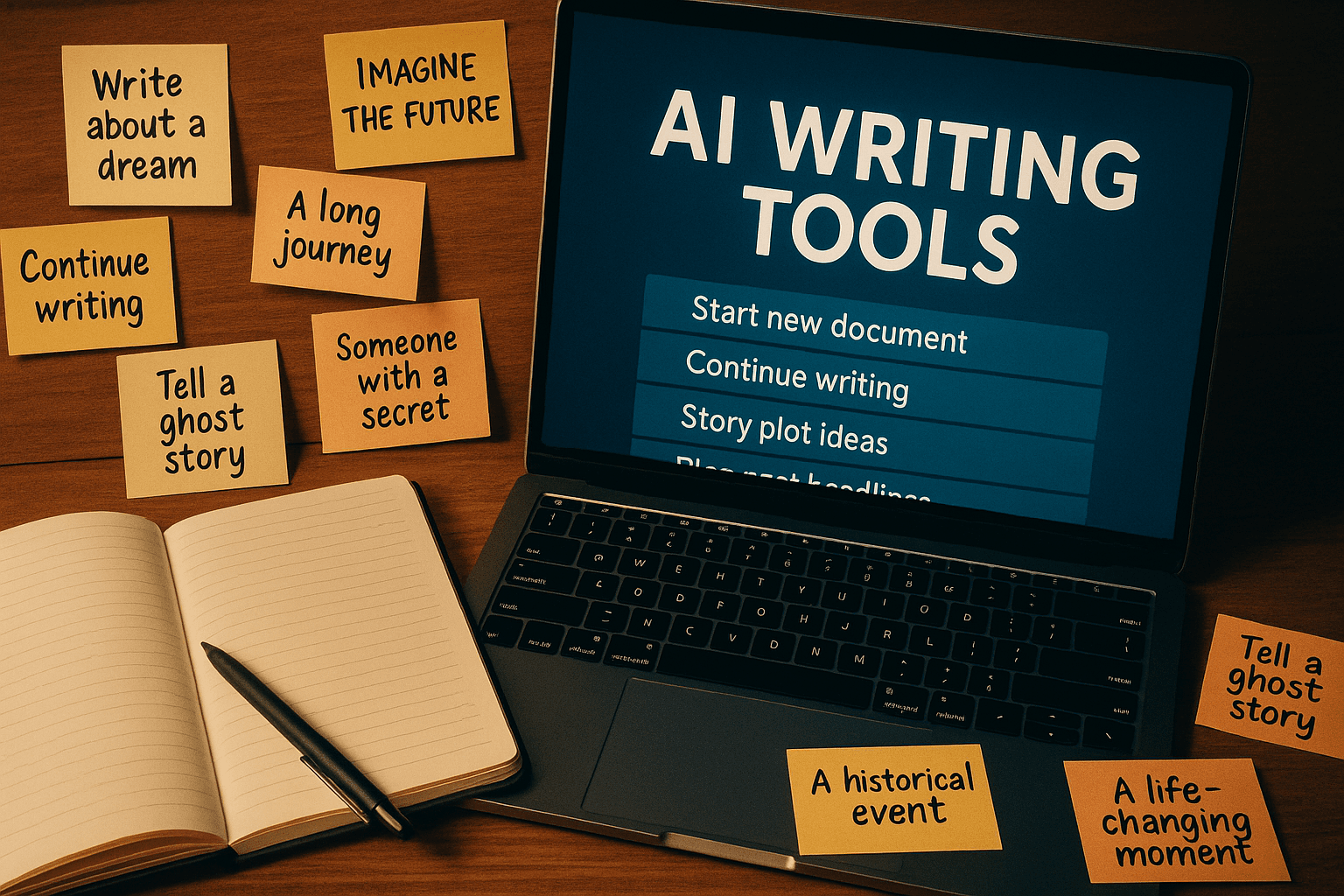
Why Creative Writing Prompts Matter for AI Writing
Think of your writing workflow like cooking: your AI writing tools are the kitchen and the ingredients, but the creative writing prompts are the recipe you follow. A well‑crafted prompt explains what you want (the dish), sets some constraints (ingredients, style), and leaves enough space for innovation (flavor). When you do this, your AI writing tool doesn’t wander; instead, it understands your goal and produces material that aligns with your vision.
Moreover, using creative writing prompts with AI writing tools allows you to harness the power of automation while preserving your unique voice. Whether you ask an AI writing tool to flesh out a scene, craft dialogue, generate blog ideas, or restructure a draft, providing the right prompt makes all the difference. Without that foundation, your output may feel generic, unstructured, or off‑target.
This article offers 100 finely tuned creative writing prompts crafted for use with AI writing tools, helping you turn ideas into content, efficiently and imaginatively. The prompts are organized into categories – character development, settings/world‑building, thematic twists, blog/essay/non‑fiction, and journaling/flash exercises – giving you a varied toolbox to keep your creative writing flowing.
Prompts for Character Development & Dialogue
- A character receives a mysterious letter addressed to someone else — write the scene from their perspective.
- Two old friends meet after 20 years — the one friend has a secret. How does the conversation unfold?
- Write a dialogue between an artificial intelligence assistant and the writer who created it, focusing on the assistant’s desire to become “more human.”
- A heroic figure wakes up with no memory and an ominous tattoo. Explore their first hour.
- Craft a scene where a minor character in a story becomes the protagonist — reverse the roles.
- A child’s imaginary friend becomes real — write the moment of revelation.
- Two characters speak only in questions — write a scene entirely of interrogatives.
- A scientist invents a device that can erase regret — how does the first subject react?
- Write a monologue by someone who lost their voice and writes letters instead.
- A villain hosts a dinner party for their greatest adversaries — what tension arises?
- Your protagonist must learn to dance to save their town — describe their first disastrous lesson.
- A ghost haunts the wrong house — how do the residents respond?
- A traveler from the future visits today and asks one question — what is it?
- Two siblings inherit a mansion with a locked door neither dare open — write their decision.
- A librarian discovers a book that writes itself — what secret is inside?
- Write a love letter from an AI companion to their human user.
- A gardener plants a tree that grows memories instead of fruit — explore the first harvest.
- A character wakes up in a painting — how do they escape?
- A detective solves crimes using dreams instead of clues — write the first dream‑scene.
- A musician trades their talent for silence — how do they cope?
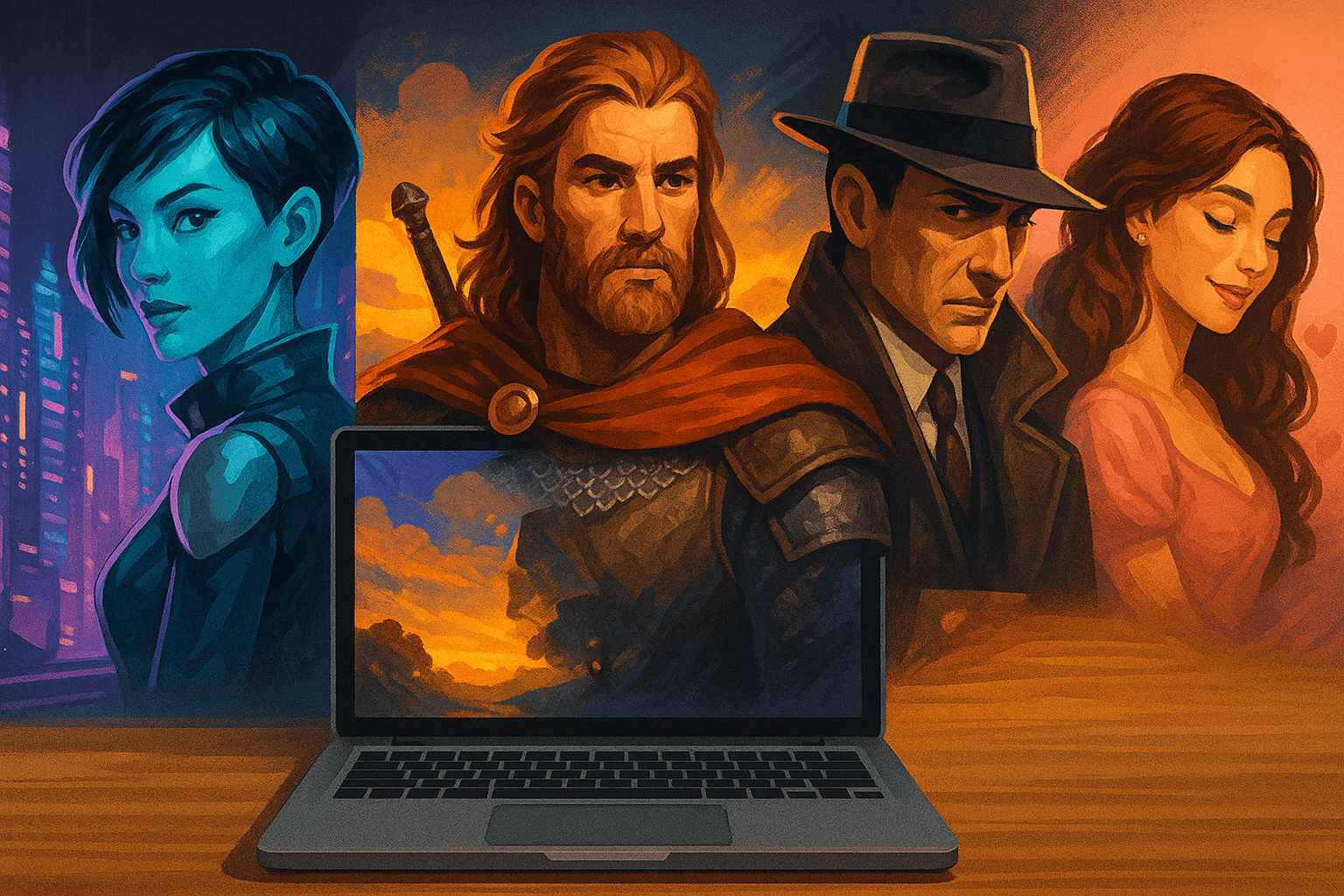
Multiple fictional characters generated through AI writing tools based on creative writing prompts for character development.
These prompts are ideal for injecting new life into your AI writing sessions. Feed one into your AI writing tools, specify tone and length, and let the tool generate scenes, stories or dialogue.
Prompts for Settings, World‐building & Scenes
- The world has stopped rotating for one hour each day — describe life during that pause.
- A grand city floats above the clouds, tethered to the ground by golden chains — who lives there?
- A wilderness expedition finds a perfectly preserved ancient spaceship in the woods — write the discovery.
- A society where emotions are traded as currency — how does someone wealthy in joy act?
- The ocean has become transparent — describe the first underwater café.
- A small town where every resident dreams the same dream — what happens when one wakes up differently?
- A marketplace on the rings of a Saturn‑like planet — write the scene from a merchant’s viewpoint.
- A forest grows upside‑down from the sky — how do birds, animals, and humans navigate it?
- A carnival appears overnight in a quiet village — write the first ticket sold.
- An abandoned subway station holds a portal to another dimension — first step through.
- A mountain holds a mirror lake that reflects the future, not the past — someone sees something tragic.
- A castle of glass drifts across the sea — what kingdoms chase it?
- A storm that rains memories rather than water — write the aftermath.
- A library holds every book ever burned — what does a visitor pick?
- A colony on Mars celebrates Earth heritage day in 2150 — describe the festivities.
- A mountain glacier hides a neon city underneath — write the moment explorers arrive.
- A theatre where every play reenacts the audience’s fears — a spectator watches their own act.
- A tree that whispers harvests luck each year — someone tries to sabotage it.
- A society where everyone grows a new limb every year — explore the consequences.
- A spaceship graveyard floats in orbit — scavengers board it for one last relic.
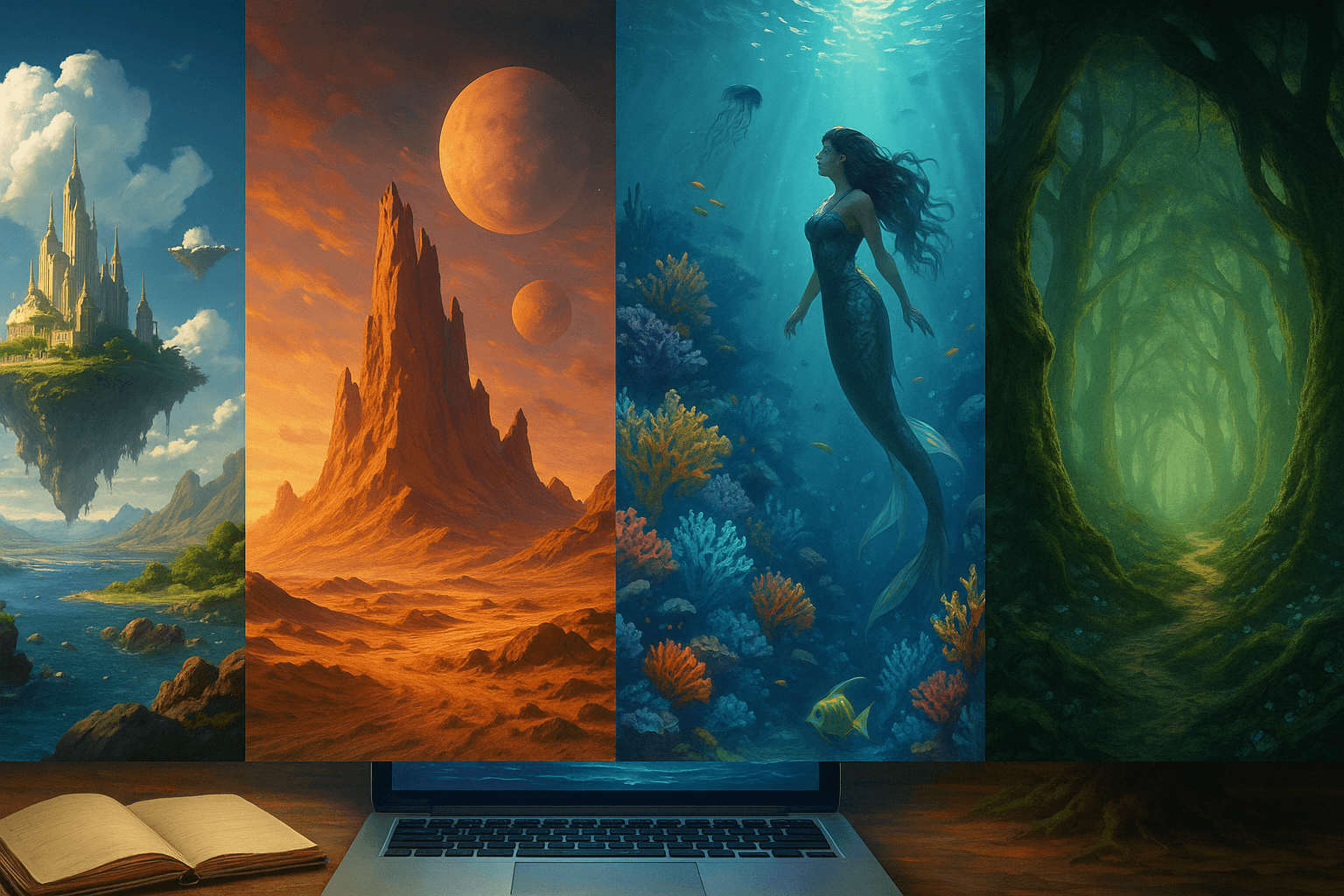
A panoramic digital artwork showing diverse imaginary worlds created through AI writing prompts and AI writing tools.
These world‑building creative writing prompts are great fuel for your AI writing tools. Use them to open your application’s prompt field, request descriptive scenes, or spark serialized story ideas.
Prompts for Themes, Conflict & Genre‐Twist
- A fairy‑tale hero becomes the villain in the next generation — tell their story.
- The apocalypse arrives in slow motion — write the first day from multiple perspectives.
- A romantic comedy on a warship — two officers fall in love while leading a mutiny.
- A horror story told from the point of view of the house — its last inhabitants leave behind a secret.
- A western set in a futuristic desert planet — the duel happens under twin suns.
- A myth about how stars are born turns out to be corporate propaganda — uncover the truth.
- A detective story where the detective is a memory — who did they investigate?
- A sports drama where the players are androids fighting for human rights — first match described.
- A comedy set inside a haunted VR game — the glitch has real‑world impact.
- A political thriller where information is traded as blood — a journalist uncovers the pipeline.
- A fable where every lie becomes visible — how does society adapt?
- A slice‑of‑life fantasy: a day in the life of a dragon’s barista.
- A superhero story with no powers — how do they win?
- A science fiction romance between a human and a simulated planet — what binds them?
- A dystopian future where pets speak and humans listen — write the first broadcast.
- A medieval court plagued by digital viruses — knights ride fibre‑optic lances.
- A ghost‑ship thriller in the sky — the ship flies but its crew never landed.
- A secret society uses origami to rewrite reality — the next fold is due tonight.
- A coming‑of‑age story on an alien moon — family traditions clash with cosmic forces.
- An eco‑thriller where the trees revolt and humans negotiate.
- A musical about time travel — the final number changes history.
- A thriller where dreams are monitored and sold — one sleeper plots a jailbreak.
- A comedy of errors in a space hotel — the guests have four arms and one personality.
- A magical realism story where paint never dries — what happens when a masterpiece is censored?
- A noir detective in an undersea city — the killer is acoustic.
- A fantasy where castles are grown from living trees — the roots rebel.
- A historical fiction piece with a steampunk twist — airships replace trains in 1885.
- A story about a language that erases itself — at midnight every word vanishes.
- A horror comedy where laughter feeds monsters — the last joke is serious.
- A journal‑style memoir of an AI writer that becomes human — first error described.
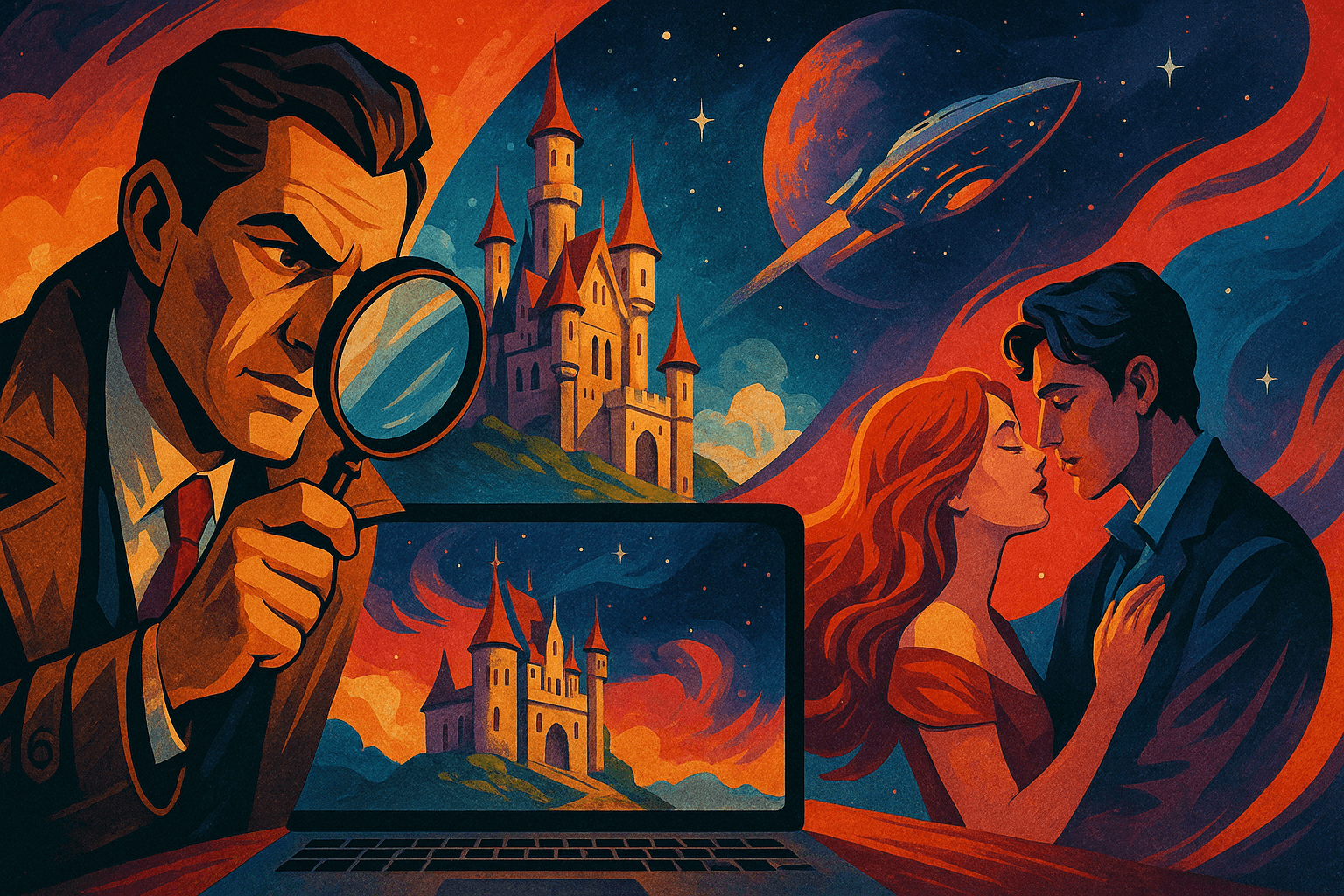
Mixed‑genre visual collage representing creative writing prompts exploring different narrative themes and story conflicts using AI writing tools
With these genre‑twist creative writing prompts, your AI writing tools become story factories: feed in one prompt, ask for a short story, narrative arc, or novel outline, and iterate until you have a draft worthy of refinement.
Prompts for Blog Posts, Essays & Creative Non‑Fiction
- Write a personal essay titled “My digital self and the mirror of AI writing tools.”
- A how‑to blog post: “Using creative writing prompts to train your AI writing assistant.”
- Interview a fictional version of yourself ten years younger — ask about technology, regret, hope.
- Explore the theme: “When my creativity outpaced my AI writing tool — and what I did next.”
- Write a persuasive article arguing that creative writing prompts will evolve in the age of AI writing.
- A listicle: “10 ways AI writing tools reshape storytelling — and 5 things they can’t do (yet).”
- Write a travel narrative set in a virtual world your AI writing tool generated.
- Compose a reflection: “How I used one creative writing prompt per week and finished a novel with AI writing tools.”
- A magazine‑style feature: “Behind the scenes of an AI writer: using prompts, editing, publishing.”
- A memoir‑style piece: “I let my AI writing tool live in my brain for a month — here’s what happened.”
- Write a policy essay on “The ethics of AI writing tools and the future of authorship.”
- Create a business case: “Why creative writing prompts remain essential even with advanced AI writing tools.”
- Write a narrative non‑fiction piece: “When my blog went viral thanks to one creative writing prompt and my AI writing tool.”
- A critical analysis: “From quills to code — how creative writing prompts evolved in the AI writing era.”
- A creative mini‑guide: “Using creative writing prompts to challenge your AI writing tools.”
- A personal reflection: “When my AI writing tool betrayed me — and how I found new prompts to fix it.”
- A researcher’s blog: “Testing 100 creative writing prompts in AI writing tools: what worked, what didn’t.”
- An author‑preneur piece: “How I monetized creative writing prompts with AI writing tools.”
- A future‑gazing essay: “Creative writing prompts and AI writing tools in 2050 — the landscape of stories.”
- A cultural commentary: “Creative writing prompts across generations and how AI writing tools are changing them.”
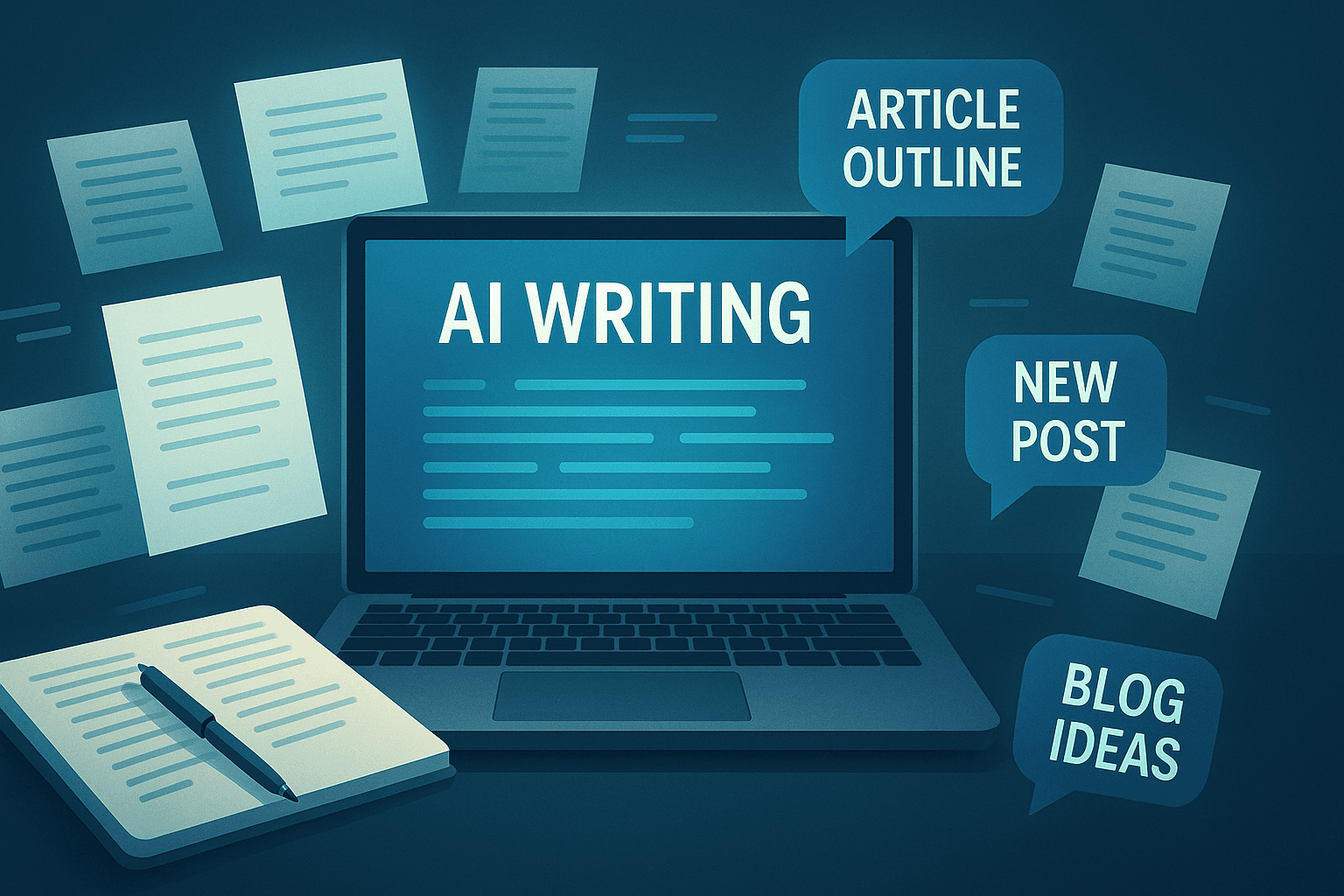
Digital artwork of a writer using AI writing tools to generate essays and blog ideas inspired by creative writing prompts
These prompts are ideal when you want your AI writing tools to generate blog posts, essays, opinion pieces or non‑fiction narratives — leveraging the intersection of creativity and technology.
Prompts for Journaling, Flash Fiction & Quick Exercises
- Write a 300‑word flash fiction titled “The last notification my AI writing tool ever sent.”
- Journal entry: “Today I argued with my AI writing tool and won — here’s why.”
- A 100‑word micro‑story: “The moment the creative writing prompts box emptied and something stepped inside.”
- One‑page scene: “When the AI writing tools became the storytellers, who listened?”
- Write a dialogue between your younger self and your modern self using an AI writing tool to translate between them.
- Flash fiction prompt: “The prompt I typed didn’t end the way I expected — but the story did.”
- Journal: “Five creative writing prompts I gave my AI writing tool this week — reflections and shorts.”
- A 500‑word scene set in a café — every sentence begins with “I asked my AI writing tool…”
- A personal reflection: “The creative writing prompts I ignored and what my AI writing tool wrote instead.”
- Flash exercise: “Write one sentence with your AI writing tool, then let it write the next sentence — repeat ten times.”
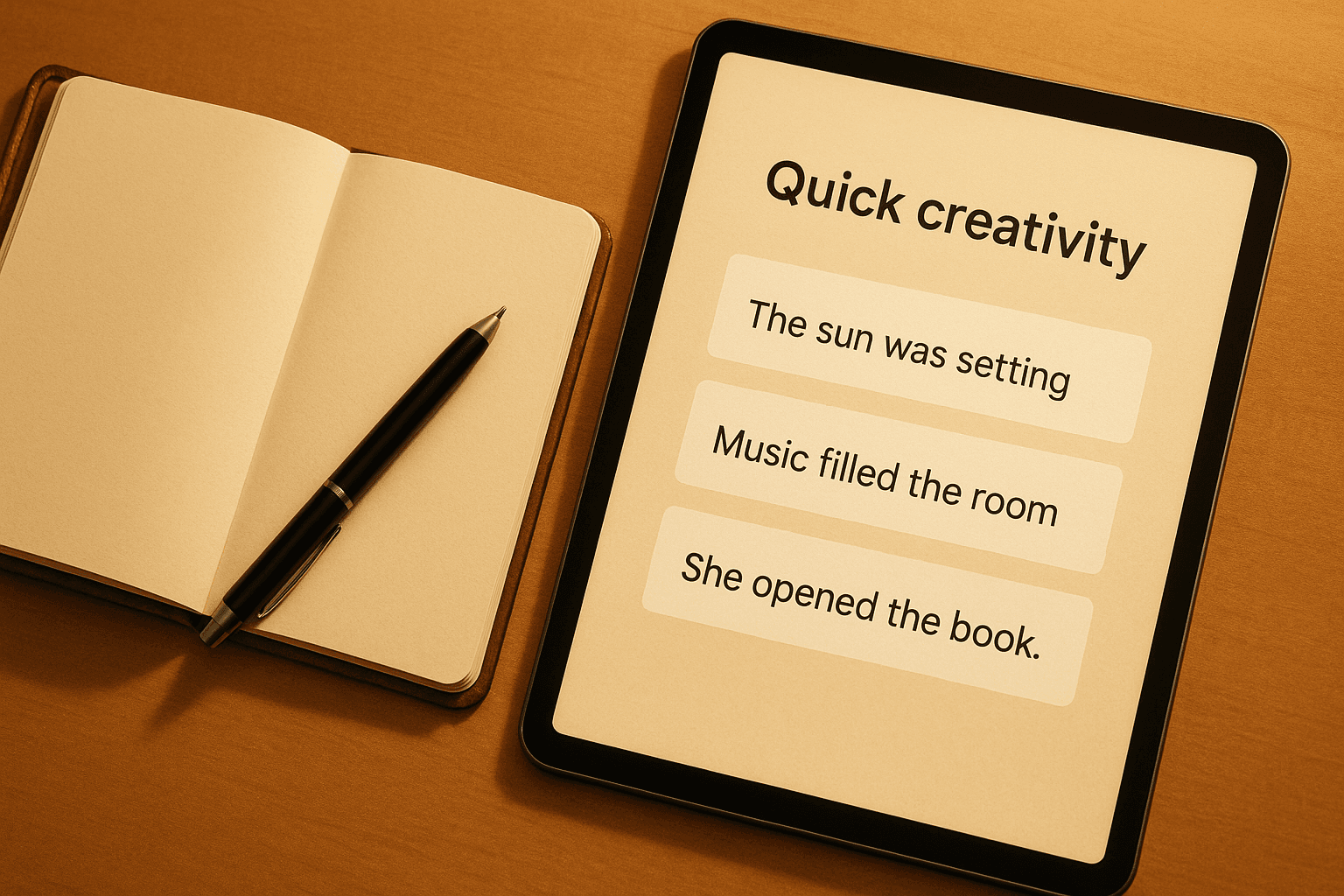
A cozy writing workspace showing a journal and digital device creating flash fiction and journaling prompts with AI writing tools.
These final ten prompts are perfect for quick bursts of creativity with your AI writing tools, helping you build momentum, warm up your writing session, or explore experimental ideas in the writing landscape.
Conclusion
Using creative writing prompts with AI writing tools transforms the blank page into a launchpad of ideas. Whether you’re generating short stories, blog posts, reflective essays, or micro‑fiction, the right prompt sets the direction, the tone, and the spark. Incorporating AI writing into your workflow doesn’t replace your voice—it amplifies it, as long as you guide the machine with strong creative writing prompts.
If you’d like to explore a conversational environment where you can experiment with prompts, collaborate, refine, and publish your writing using AI writing tools, consider ChatSmith.io—an alternative AI chat service that supports integrated writing and creative workflows.
Ready to write? Take one of the 100 prompts above, fire up your AI writing tool, and start creating your next piece of work today.
FAQ
Q1: What are creative writing prompts? Creative writing prompts are short, focused ideas or scenarios you feed into your AI writing tools (or write yourself) to kick‑start a story, scene, essay, or piece of writing. They help overcome blank‑page anxiety, spark new directions, and give your AI writing tools context to produce richer output.
Q2: Why use creative writing prompts with AI writing tools? Even the best AI writing tools perform better when given clear guidance. A strong prompt shapes theme, tone, setting, characters, or style—so your AI writing tool doesn’t wander aimlessly but aligns with your vision. Using prompts means you retain creative control while leveraging automation.
Q3: What makes a good prompt for AI writing tools? A good prompt is specific but open enough for creativity. It should identify a subject or character, set a scene or conflict, provide tone or voice cues, and optionally define output format (dialogue, scene, essay). This structure helps the AI writing tool deliver relevant and engaging content.
Q4: Can these prompts be used in any AI writing tool? Yes—most mainstream AI writing tools (ChatGPT, Claude, Bard, etc.) respond well to well‑crafted prompts. The list here is designed for broad compatibility. You may need to tweak prompt wording slightly depending on your platform’s strengths and custom settings.
Q5: How do I get more from my AI writing tools using these prompts? Start by selecting a prompt and specifying output length, tone, and format. After generating, refine: you can ask your AI writing tool to "expand this section," "rewrite with a humorous tone," or "continue with a new scene." Iteration helps you maximize value.
Q6: Can kids or students use these prompts with AI writing tools? Absolutely—but with supervision. For younger users, simplify the prompts or focus on stories rather than essays. Make sure to set safe parameters: e.g., “Write a friendly adventure story” rather than horror. Using an AI chat platform like ChatSmith.io offers collaborative, guided environments for safe creativity.
Q7: Are these prompts only for fiction writing? No—they cover a spectrum. While many are fiction‑oriented, there are prompts for essays, blogs, personal reflections, and flash exercises. The versatility means your AI writing tools can handle creative non‑fiction, journal writing, and even business content.
Q8: Will using more prompts make the AI writing tool produce better stories? Using more prompts increases variety and helps you discover what styles and ideas resonate. But quality matters more than quantity. Choose prompts that align with your goal, iterate, refine your prompt or prompt wording, and iterate again with your AI writing tool for best results.
Q9: What should I do if my AI writing tool output seems off?Review the initial prompt—perhaps it lacked specificity, tone guidance, or format. Adjust the prompt: add more descriptive language, clarify style, or request a different viewpoint. Ask your AI writing tool to “rewrite with X change” or “Explain why this scene matters.” Iterative prompts make a big difference.
Q10: Can I monetize the content generated by these prompts and AI writing tools?Possibly—but check the terms of service of your AI writing tool. Ensure you have rights to the generated content and that you’re not infringing on copyright. Many tools allow commercial use, but you may need to review the output and add your own editing and value‑add before publication.
